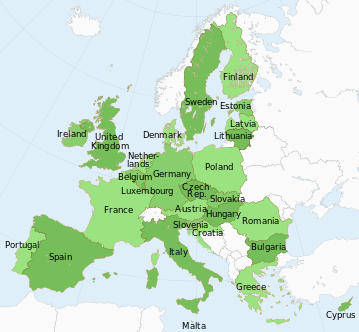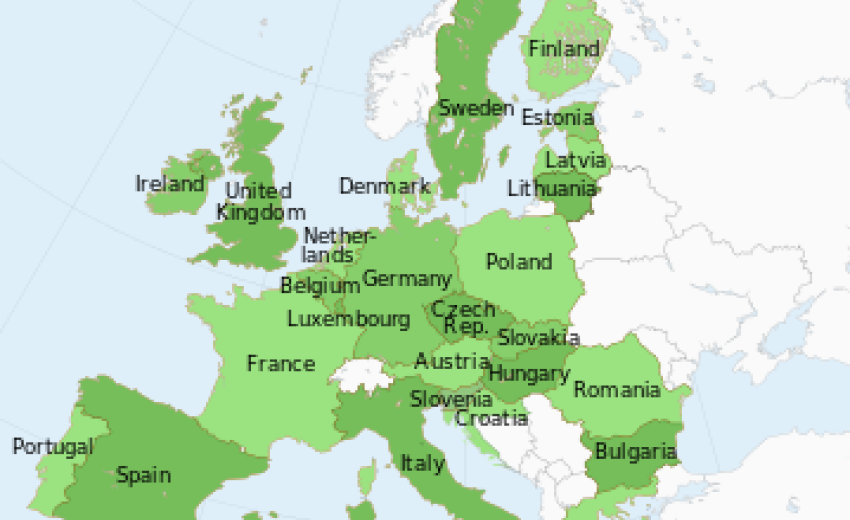 |
| (en.wikipedia) |
There are about 700,000 Sikhs in the UK and the Sikh vote will count, even if we are not counted or monitored accurately as Sikhs under the current unsatisfactory system based on rather a vague concept of ethnicity. The Sikhs are in a position to influence the outcome of the referendum and the senior politicians are well aware of this. Some have argued Sikhi universal principles to support staying in the EU. I shall pick up this point later in this article.
In the early 1980's I worked closely with an European Economic Community (EEC) team on two major projects - the "Single Document" for movement of goods across the EEC and the Harmonised System for tariffs in preparation for the World Trade Round (the 8th round of multilateral trade negotiations which started on 1986 called the Uruguay Round.). The fact is that the original arguments for creating a "common market" - a trading block - in which there would be unrestricted movement of labour, goods (using a Single Document) and capital, are no longer valid due to the enlargement and creation of an unwieldy hotchpotch of 28 states with very diverse economies.
UK joined the European Community in 1973 when there were nine western European countries. These were Belgium, Denmark, France, Germany, Ireland, Italy, Luxembourg, Netherlands and the UK. These were developed and comparable economies to some extent so that movement of capital (finance and companies), goods and services, and labour (migration) was expected within these countries in a balanced sort of way and not in any one direction. They also undertook large scale shared projects because all could contribute financially and technically. The Airbus and the European Transonic Wind-tunnel projects are example based on personal experience.
In due course, such a trading block protected by one tariff system negotiated with the rest of the world, would require harmonization in all areas to ensure a level playing field e.g. in areas such as laws, rules and regulations, standards, minimum wages, monetary policies and so on, the list is long.
The inevitable move would be towards some sort of political union through a supranational government structure with transfer of powers from national parliaments and governments to the centre i.e. to the European Commission and the European Parliament in case of the EU. Some would argue that that is a good exchange in return for access to a much larger market.
Over the decades, there has been continual power transfer from the UK Parliament and Ministers to Brussels' bureaucrats. The amount of waste through some policies e.g. agricultural policies and subsidies, and resultant waste of farm products, has been on a mind-boggling scale due to short-termist trade-offs between government negotiators.
At local level there has been a shift of representational accountability from the Member of Parliament (MP) to the Member of European Parliement (MEP), while the latter is not accountable to the same extent as the local MP. Many do not even know the names of their MEPs! So much for local accountability.
The shift of power from the national Parliament to EU institutions was the prediction of those who were working close to the EU establishment and institutions in 1973 when UK joined the EU, and that is precisely the direction the EU is taking. A common economic market cannot work without harmonisation across all fields and that must inevitably lead to the creation of a super-state.
In any case, the idea of an exclusive trading block goes against the ideals of free trade on fair terms - the main objective of World Trade Rounds. The ultimate objective is global prosperity, not the enrichment of some trading block of the richer countries by removing internal tariffs only and subsidising internal products while taxing those from poorer countries by a common tariff. The argument put forward by some UK Sikhs that the Sikhi universal principles would support staying in the EU does not make sense to me even though there are strong economic reasons to remaining within the EU.
There are 28 countries in the European Union (EU) with a total population of just over 508 million (Eurostat population on 2 January 2015). EU area of 4,381,376 sq.km. compares with 3,287, 263 sq km of India with a population of 1,254 million. So, EU is larger than India, much richer, but with less than half the population of India.
Similar arguments for economic migration to EU would apply to many countries in Asia, the Middle-East, and Africa. In addition, an unstable world has an increasing movement of asylum seekers.
The population growth rates of the poorer countries are much higher than EU countries while the economies and the socio-political environments much less secure. Human rights situation in many countries is quite appalling. So, the fact is that whether the UK remains in the EU or gets out of it, the problem of legal or illegal immigration and asylum seekers will have to be faced by the UK. They will come by air or by sea from neighbouring mainland Europe or directly from north Africa,
Leaving aside the extreme right agenda, the immigration issue is now perceived even by some moderates as a sort of uncontrolled invasion which can unbalance the social, health, educational and welfare systems in the UK. It is also seen as a security risk due to the mixing of terrorists amongst genuine immigrants and asylum seekers.
There is no easy solution to flow of immigrants from poorer to richer countries, except perhaps global solutions to such global problems. Cheap IT - e.g. mobiles with Web audio-visual facilities in the hands of the poorest young men and women give many one aim in life: to somehow reach a Western country. Most of us were motivated by economic and better education arguments to come to these countries. Those who wanted to return within 5 or 10 years are still here with their grandchildren! The conditions in the countries we come from have not improved significantly.
Massive publicity is being given to both sides of the referendum argument. A government booklet promoting the "stay-in" argument, states "less than 8% of EU exports come to the UK while 44% of UK exports go to the EU." This is playing with percentages, because, for all we know, 8% of EU (28 countries) exports to the UK could be a much larger amount than 44% of UK exports to the EU! The straight answer voters would want is if UK's net exports to the EU countries are more than net imports after taking account of all the additional costs of EU membership. That may be the case, but many have doubts.
Free movement of labour is a founding principle of the EU's "common market". It continues to be a form of discrimination along white and non-white lines. For British Sikhs, it is not a freedom of movement in the EU, because Sikh identity continues to be challenged in Europe.
If UK remains within the EU, over a period of time and in stages, non-whites, now flooding into Europe in large numbers from many directions, for many reasons and by various means, would qualify to come over to the UK for work. So, one can argue that in the longer term, more non-whites will also enter UK via Europe if UK remains in the EU. Actually, the vast economic disparities within the EU, and the massive migration of labour from the EU's poorer and economically mismanaged countries to the richer Western European countries, will remain linked. For the same reasons, the single currency idea made little sense and UK saw this in a timely manner and kept out.
The whole balance began to be disturbed when middle and eastern European countries joined in. Surely, this should have been expected. Companies, people and goods would move to the richer countries not those in eastern Europe, some of which were part of the failed communist state. The counter argument can be that companies would move to areas where there is cheap labour, but then labour would move to countries where there are higher wages, a welfare state and better education! Where there is a good system of administration, law and order and better human rights record. UK is certainly one such country and we should not at all be surprised that there is large scale migration of labour from EU's eastern European countries like Poland, Romania, Bulgaria, Estonia, Latvia, Lithuania and countries of former Yugoslavia. Border controls by UK can slow down this trend but only up to a certain degree due to political influences. On the top of that there is the world refugee crisis.
One clear impression gained from the referendum debate is that UK is caught up in a most difficult Catch-22 situation. If UK gets out of EU, the immediate and middle-term damage to the economy can be considerable while new deals are being negotiated. Yet, to stay in would mean that the present unsatisfactory situation will continue.
The Sikhs are one of the most hardworking and prosperous British communities, doing well in most fields despite the prejudice they have suffered and continue to face due to the distinct Sikh identity. The pressure on every Sikh since arrival in the UK and Europe has been to discard his identity, mix with the crowd and do well. Therefore, most have chosen this easier path to material success.
Nevertheless, they are Sikhs at heart, follow Sikh religio-cultural tradition and even enjoy the rustic Punjabi idiom when in each other's company. Many in my generation have reverted to full Sikh identity when the compulsions to discard that identity are no longer there.
Children of first generation Sikhs have excelled in studies and the top professions. Sikh identity rights have been ignored in a most careless manner in Europe. The question before us is if they would migrate to other Western countries if the future of UK looks less certain after the EU referendum.
Driven purely by commercial and consumer considerations, the EU idea would have short and middle term advantages. However, the longer term serious problems for the much enlarged EU are yet to come, more so when other eastern European countries like Turkey, join in.
Gurmukh Singh OBE
(Principal Civil Servant UK ret'd)
E-mail: [email protected]
What does Brexit mean?
It is a word that has become used as a shorthand way of saying the UK leaving the EU - merging the words Britain and exit to get Brexit, in a same way as a Greek exit from the EU was dubbed Grexit in the past.






